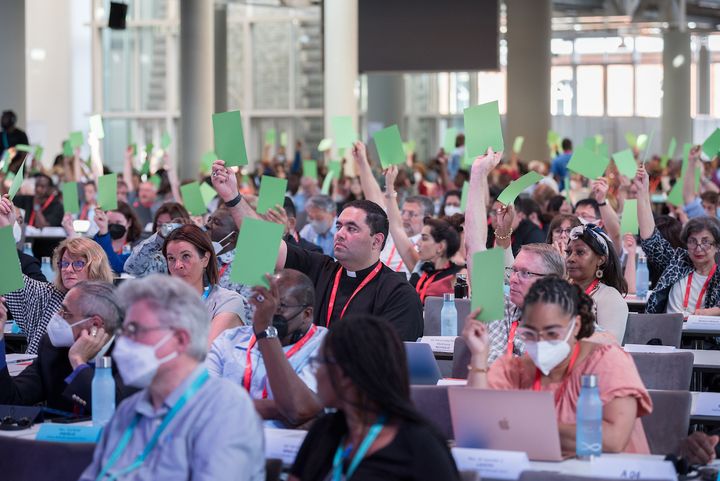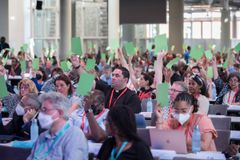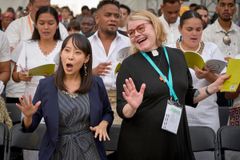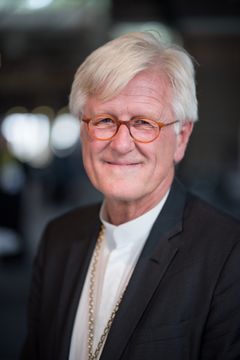The world’s churches agreed on the way forward

8 September 2022 18:40:35 | The Church of Sweden
The theme of the meeting was Christ’s love moves the world to reconciliation and unity. With this in mind, the churches have sought ways to tackle today’s global challenges.
The climate crisis and how it particularly affects already hard-hit parts of the world has long been high on the churches’ agenda. Karlsruhe sharpened that focus further, including the decision to appoint a special commission to push for climate justice – that the countries accounting for the majority of the world’s emissions also have a special responsibility to reduce them and deal with the consequences of global warming.
The churches’ relationship with indigenous peoples was another area that was clearly highlighted during the Assembly, with the need for reconciliation work similar to that which the Church of Sweden is engaged in with the Sami population.
Basic peace work was also given prominence, with churches emphasising the importance of interfaith dialogue and cooperation and of countering polarisation in their various contexts.
Clear commitments were also made to giving more space to young people’s voices and to groups with special needs.
Statements on topical issues
The Assembly also agreed on a number of statements, with the war in Ukraine and the situation in Israel-Palestine, as expected, generating the most intense discussions.
The statement on Ukraine calls the war unjust and demands an immediate ceasefire and withdrawal of Russian troops. However, voices calling for the exclusion of the Russian Orthodox Church from the fellowship were not heard, with the churches instead committing themselves to continued and intensified dialogue.
A number of churches have argued that the concept of apartheid is applicable to Israel’s policies towards the Palestinians, while others strongly oppose this. In its final statement, the Assembly criticises Israel’s settler policy and condemns violence from bots sides, but does not use the term apartheid to describe the situation, stating only that there is disagreement and that the struggle for a just peace must continue.
Prayer and worship united
Many testimonies from the Assembly have highlighted fellowship in spite of differences and the strength of worshipping, singing and praying together in a variety of languages and traditions. This is also something that the head of the Church of Sweden’s delegation, Archbishop Antje Jackelén, wishes to seize upon.
“The most important thing is that we have actually met: several thousand people from all over the world, with a diversity that is both a joy and a challenge; in worship, Bible study and grappling with the great and difficult questions of our time.”
“We have spent a lot of time identifying the common voice of the churches, and we have taken steps forward on climate justice, war and peace, and on the conscious inclusion of youth and indigenous peoples. When we work on what is most challenging for humanity and we do so in the light of faith, hope is strengthened.”
New Central Committee
The Assembly also elected a new Central Committee, which is the governing body of the World Council of Churches. It consists of 150 members and is responsible for ensuring that the work decided upon is carried out. Three Swedish delegates were elected: Julia Rensberg and Celina Falk from the Church of Sweden and Emma Gunnarsson from the Uniting Church in Sweden.
New moderator
One of the Central Committee’s first tasks was to elect a new moderator (chairperson) of the World Council of Churches to replace Agnes Aboum of the Anglican Church of Kenya, who had held the post for nine years.
Bishop Heinrich Bedford-Strohm of the Evangelical Lutheran Church in Bavaria, Germany, was elected as the new moderator. Merlyn Hyde Riley, pastor of the Jamaica Baptist Union, and Archbishop Vicken Aykazian of the Armenian Apostolic Church were elected as vice moderators.
The World Council of Churches (WCC)
The World Council of Churches was founded in 1948 in Amsterdam. It is the largest ecumenical organisation in the world, with 352 member churches in 120 countries, representing nearly 600 million Christians worldwide. The overall goal is to work for unity among the world’s churches and to work together for peace, justice and sustainability. The World Council of Churches has its administrative headquarters in Geneva, Switzerland. The Assembly meets every eight years to take decisions, make joint statements and set the direction of work for the coming years.
Read more about the Assembly on the World Council of Churches’ website.
Keywords
Contacts
Press secretary on duty
Tel:+46 18 16 94 75Images



About Svenska kyrkan
The Church of Sweden is a national church, open to everyone living in Sweden regardless of nationality. It is a place for church services, meetings and dialogue. The Church of Sweden is an Evangelical Lutheran church with 5,9 million members. There are 3500 churches in Sweden, and 13 dioceses.
The international work
Collaborating and cooperating with other churches and organisations is at the core of the Church of Sweden´s international mission. As a church, we are part of the worldwide community of churches.
Subscribe to releases from Svenska kyrkan
Subscribe to all the latest releases from Svenska kyrkan by registering your e-mail address below. You can unsubscribe at any time.
Latest releases from Svenska kyrkan
Ungomsfilmpris till drama om prövad vänskap15.3.2024 22:29:51 CET | Pressmeddelande
Den fransk-marockanska filmen Sisterhood, av regissören Nora El Hourch får Svenska kyrkans ungdomsfilmpris 2024. Priset delades ut i kväll under den pågående Barn- och ungdomsfilmfestivalen, BUFF, i Malmö.
Ny generalsekreterare utsedd28.2.2024 10:00:00 CET | Pressmeddelande
Kyrkostyrelsen har utsett Camilla Asp till ny generalsekreterare för Svenska kyrkan. Hon kommer närmast från tjänsten som överdirektör på Myndigheten för samhällsskydd och beredskap (MSB). Camilla Asp efterträder Helén Ottosson Lovén som i juni går i pension.
Dela lika och rädda liv9.2.2024 07:00:00 CET | Pressmeddelande
Var tionde människa i världen saknar mat för dagen trots att det finns tillräckligt med resurser för att alla ska kunna äta sig mätta. Vi lever alla under samma himmel, men delar inte lika på jordens resurser. Den 11 februari inleds årets fasteaktion med temat Dela lika och rädda liv.
Svenska kyrkans filmpris till Om alla bara drar28.1.2024 16:48:32 CET | Pressmeddelande
Svenska kyrkans filmpris 2024 går till dokumentärfilmen Om alla bara drar, av Nazira Abzalova och Karin Wegsjö. Priset delades ut i dag söndag av biskop Susanne Rappmann i samband med filmens premiär på den pågående Göteborg Film Festival.
Nytt biskopsbrev om livets början och livets slut23.1.2024 08:30:53 CET | Pressmeddelande
Idag publicerar Svenska kyrkans biskopar ett nytt biskopsbrev med titeln ”Livets början och livets slut - redskap för orientering i etiska vägval”. De ställer frågor om vad ett liv är, när det börjar och när det tar slut. Biskopsbrevet lanseras i samband med att biskoparna är samlade i Härnösand.
In our pressroom you can read all our latest releases, find our press contacts, images, documents and other relevant information about us.
Visit our pressroom
